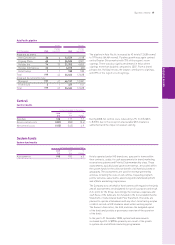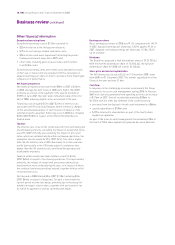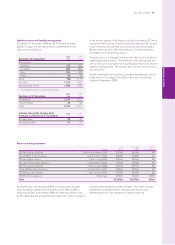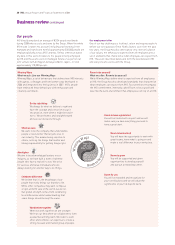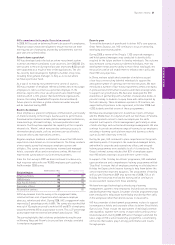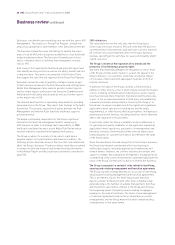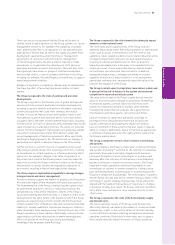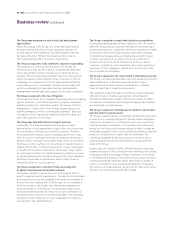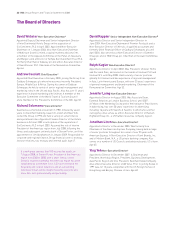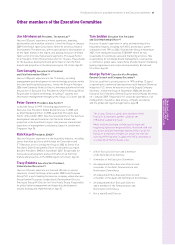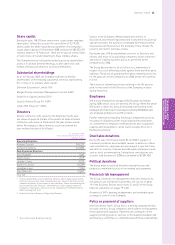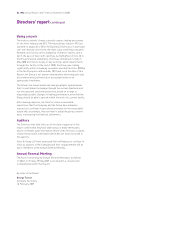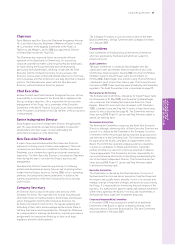Holiday Inn 2008 Annual Report Download - page 29
Download and view the complete annual report
Please find page 29 of the 2008 Holiday Inn annual report below. You can navigate through the pages in the report by either clicking on the pages listed below, or by using the keyword search tool below to find specific information within the annual report.
BUSINESS REVIEW
Business review 27
There can also be no assurance that the Group will be able to
identify, retain or add franchisees to the Group system or to secure
management contracts. For example, the availability of suitable
sites, planning and other local regulations or the availability and
affordability of finance may all restrict the supply of suitable hotel
development opportunities under franchise or management
agreements. In connection with entering into management
or franchise agreements, the Group may be required to make
investments in, or guarantee the obligations of, third parties or
guarantee minimum income to third parties. There are also risks
that significant franchisees or groups of franchisees may have
interests that conflict, or are not aligned, with those of the Group
including, for example, the unwillingness of franchisees to support
brand improvement initiatives.
Changes in legislation or regulatory changes may be implemented
that have the effect of favouring franchisees relative to brand
owners.
The Group is exposed to the risks of political and economic
developments
The Group is exposed to the inherent risks of global and regional
adverse political, economic and financial market developments,
including recession, inflation, availability of affordable credit and
currency fluctuations that could lower revenues and reduce
income. A recession reduces leisure and business travel to and
from affected countries and adversely affects room rates and/or
occupancy levels and other income-generating activities, resulting
in deterioration of results of operations and potentially reducing the
value of properties in affected economies. The owners or potential
owners of hotels managed or franchised by one group face similar
risks which could adversely impact IHG’s ability to retain and
secure management or franchise agreements. More specifically,
the Group is highly exposed to the US market and, accordingly, is
particularly susceptible to adverse changes in the US economy.
Further political or economic factors or regulatory action could
effectively prevent the Group from receiving profits from, or selling
its investments in, certain countries, or otherwise adversely affect
operations. For example, changes to tax rates or legislation in
the jurisdictions in which the Group operates could decrease the
proportion of profits the Group is entitled to retain, or the Group’s
interpretation of various tax laws and regulations may prove to
be incorrect, resulting in higher than expected tax charges.
The Group requires organisational capability to manage changes
in key personnel and senior management
In order to develop, support and market its products, the Group must
hire and retain highly skilled employees with particular expertise.
The implementation of the Group’s strategic business plans could
be undermined by failure to recruit or retain key personnel, the
unexpected loss of key senior employees, failures in the Group’s
succession planning and incentive plans, or a failure to invest in the
development of key skills. Some of the markets in which the Group
operates are experiencing economic growth and the Group must
compete against other companies inside and outside the hospitality
industry for suitably qualified or experienced employees. Failure to
attract and retain these employees may threaten the success of the
Group’s operations in these markets. Additionally, unless skills are
supported by a sufficient infrastructure to enable knowledge and
skills to be passed on, the Group risks losing accumulated
knowledge if key employees leave the Group.
The Group is exposed to the risk of events that adversely impact
domestic or international travel
The room rates and occupancy levels of the Group could be
adversely impacted by events that reduce domestic or international
travel, such as actual or threatened acts of terrorism or war,
epidemics, travel-related accidents, travel-related industrial action,
increased transportation and fuel costs and natural disasters,
resulting in reduced worldwide travel or other local factors
impacting individual hotels. A decrease in the demand for hotel
rooms as a result of such events may have an adverse impact
on the Group’s operations and financial results. In addition,
inadequate preparedness, contingency planning or recovery
capability in relation to a major incident or crisis may prevent
operational continuity and consequently impact the value of the
brand or the reputation of the Group.
The Group is reliant upon its proprietary reservations system and
is exposed to the risk of failures in the system and increased
competition in reservations infrastructure
The value of the brands of the Group is partly derived from the
ability to drive reservations through its proprietary HolidexPlus
reservations system, a central repository of all hotel room
inventories linked electronically to multiple sales channels
including IHG owned Internet websites, third-party Internet
intermediaries and travel agents, call centres and hotels.
Lack of resilience in operational availability could lead to
prolonged service disruption and may result in significant
business interruption and subsequent impact on revenues.
Lack of investment in these systems may also result in reduced
ability to compete. Additionally, failure to maintain an appropriate
e-commerce strategy and select the right partners could erode
the Group’s market share.
The Group is exposed to certain risks in relation to technology
and systems
To varying degrees, the Group is reliant upon certain technologies
and systems (including IT systems) for the running of its business,
particularly those which are highly integrated with business
processes. Disruption to those technologies or systems could
adversely affect the efficiency of the business, notwithstanding
business continuity or disaster recovery processes. The Group
may have to make substantial additional investments in new
technologies or systems to remain competitive. Failing to keep
pace with developments in technologies or systems may put the
Group at a competitive disadvantage. The technologies or systems
that the Group chooses may not be commercially successful or the
technology or system strategy employed may not be sufficiently
aligned with the needs of the business or responsive to changes
in business strategy. As a result, the Group could lose customers,
fail to attract new customers or incur substantial costs or face
other losses.
The Group is exposed to the risks of the hotel industry supply
and demand cycle
The future operating results of the Group could be adversely
affected by industry overcapacity (by number of rooms) and weak
demand due, in part, to the cyclical nature of the hotel industry,
or other differences between planning assumptions and actual
operating conditions. Reductions in room rates and occupancy
levels would adversely impact the results of Group operations.


